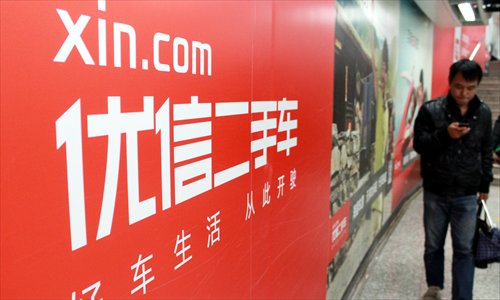China sees boom in online marketplaces for used cars

In August, the online used car marketplace xin.com spent 180 million yuan ($28.11 million) to sponsor the online broadcast of the wildly popular reality show Running Man that started on October 30.
It was one of many such platforms that have launched aggressive, and expensive, advertising campaigns to sell consumers on the idea of buying vehicles over the Internet.
Consumers have taken notice. "Commercials for used car platforms are everywhere these days," said Han Peng, a 30-year old Beijing resident.
"I see them in my office building, in my neighborhood and even when I am watching videos online."
Online used car marketplaces are the latest hot spot in China's Internet sector. Following group-buying websites, food-delivery websites, and car-hailing apps, online used car marketplaces may become the next major growth market in the industry, and have already attracted major investors.
Online sales of used cars have grown rapidly this year. In the first half of 2015, sales surged 139 percent year-on-year to 478,000 units, Analysys International said in a report released on September 25. The consultancy forecast sales would continue to accelerate over the next three years.
Han, who drives a Volkswagen Sagitar sedan, might be one of those customers.
"I would consider selling my car on one of these websites when I replace it for a better one in a couple of years," he told the Global Times on Sunday.
A surging market
Online marketplaces for used cars started springing up in China in 2010. It was heady days for the domestic auto industry. Sales were booming as car owners sought to replace their cars with newer models.
Cheyipai.com was one of the first. Founded in 2010, it offers a platform for consumers to sell their used cars to dealerships. As the market evolved, online used car dealers began selling directly to individuals. Over the last two years, online marketplaces that sell to businesses and to consumers have both grown rapidly.
Selling used cars online has advantages over the traditional used car dealership, said Qian Wenying, an analyst at Analysys International. The major selling points of online dealerships are simpler transaction procedures and greater transparency.
Some online used car marketplaces, such as renrenche.com, hire third-party agencies to evaluate the vehicles sold on their platforms. At some dealerships, it is common for salesmen to conceal information about the cars, making it easy to cheat buyers. Also, dealerships will usually mark up a used cars price by 20-35 percent, analysts said. Buyers can get a better deal online. Platforms such as renrenche.com charge a commission of about 3 percent.
Capital dependent
It is still too early to say whether online platforms for used cars can actually turn a profit. Analysts have pointed out that a 3 percent commission is far from enough to cover their huge operating and promotion costs, given the limited number of transactions.
Like other online platforms, financing is crucial for their survival, especially at a time when investors are more cautious about investing in online-to-offline (O2O) businesses. The leading online platforms for used cars are all backed by major Internet companies. Tencent Holdings and smartphone maker Xiaomi Technology have invested in renrenche.com. And search giant Baidu Inc has invested in xin.com.
But without continuous capital investment, it is inevitable that some platforms will fall by the wayside. This happens in other online auto services. For example, around six online car wash services providers have gone bankrupt since the beginning of this year, according to media reports.
The history of other O2O businesses shows that only one or two companies will survive the inevitable industry consolidation. In the online car-hailing business, Didi Kuaidi was the only domestic company to survive. For food delivery, over 80 percent of the market is dominated by three companies: Baidu's platform waimai.baidu.com, waimai.meituan.com and v5.ele.me, according to Analysys International.
Although it is expected that online used car platforms will undergo similar consolidation, China's used car market remains underdeveloped, leaving tremendous potential for online sales, said Su Hui, an expert at Beijing-based China Automobile Dealers Association (CADA).
Qian shared this view. She noted online used cars sales account for less than 10 percent of the used car market and are expected to continue to grow.
In countries such as the US, there are four times as many used cars sales as new vehicle sales. But in China, there are three new cars sold for every used car sold, Qian told the Global Times on Thursday.
In addition, online used car platforms have ways beside commissions to make money, such as providing auto loans and selling car insurance.
Policy roadblocks
Despite its bright prospects, there are still several policy barriers that hinder the growth of secondhand car market, Su said.
Currently, more than 300 cities in China have set limitations on the sales of used cars. For instance, secondhand cars that fail to meet the National 5 vehicle emission standards, equivalent to the Euro V emission standard which applies to passengers as well as light vehicles in EU member countries, are not allowed to be sold in Beijing. In some cities, used cars older than three years are not allowed to be sold.
"With such policy barriers, both online and off-line sales of secondhand cars will be hindered," Su said, calling for reform of such policies.
Qian noted that the lack of a unified national evaluation standard for used cars is also a major obstacle.
The CADA created a set of standards in 2014, but they still have not been accepted nationwide, she said.
Newspaper headline: Click to buy